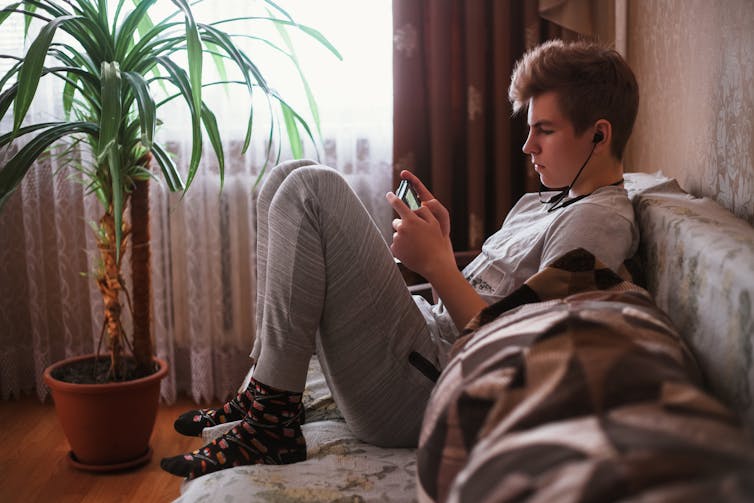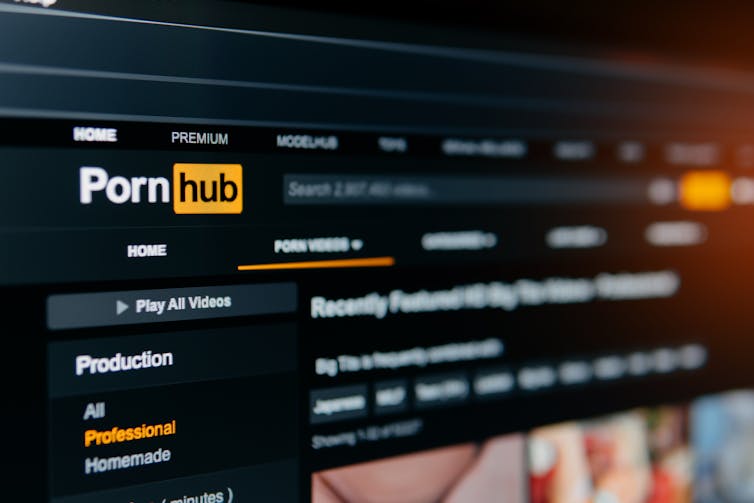Pornography has been in the news a lot this year. It was at the centre of discussions for addressing violence against women back in May. Deepfake pornography has also been in the headlines.
Now the New South Wales government has announced the first state-led inquiry into the “impacts of harmful pornography”. The negative framing of the inquiry risks revisiting old arguments, rather than advancing the debate and policies.
Much of this debate has centred around the potential harm to teenagers, but very few people have interviewed teens about it. As part of our research, we asked teens about their experiences of porn and found many have a nuanced understanding of the risks, but also the benefits.
Filling an information vacuum
In our project, we asked 108 parents and teenagers from Australia, Greece, Norway and Ireland what they thought of online sexual content. We spoke to 50 Australian teens (aged 11–17) through interviews and focus groups about their perceptions of pornography.
We found teens hold very mixed views about both porn and sexting. Some of these views were positive.
For example, many young people recognise some benefit to being able to access pornography as a source of knowledge, particularly when sex is not discussed in schools.

Shutterstock
Sixteen-year-old Miles said accessing porn can be useful:
A lot of people don’t know a lot [about sex] – but at this point I’d say, it would be good for under 16s [accessing porn] just because of the lack of actual education that you get at school about it.
Teens also sense both educators and parents’ discomfort with discussing sex and porn. Seventeen-year-old Warren said:
Talking to other people about [sex], it’s pretty awkward, but if I’m just watching it, I learn better.
Porn may offer more accessible and explicit representations of sex and bodies that schools cannot. Caris (aged 15) believed porn could be a good resource to learn about “pleasure [and] self-pleasure”. They said porn can assist with “learning what to do”.
Fourteen-year-old Tiffany agreed it could be instructive:
It can help you figure out what you may like, or not like, your […] preferences.
Copying what they see
Clearly, such perspectives are not without risk. Other teens recognised potentially harmful impacts of porn such as a lack of condom use displayed, objectification of women, no consent negotiated on screen, and concerns that others may copy acts they see in porn. Twelve-year-old Levi said:
In those videos they never really go over consent, they just go straight into doing it. I feel like it would harm you in those ways, if you aren’t educated otherwise.
Tiffany said:
A lot of people know that this is unrealistic but there are some that think, ‘oh my gosh, that’s what everyone should be like’, which can be harmful to quite a few people.
In our new study, we recommend that policy-makers and researchers should listen to teens, giving more importance to their firsthand experiences over secondhand statements. Secondhand statements tend to repeat warnings teens hear from others. Their actual experiences may be different from those represented in the media. Examples of experiences include Lauren’s perspective (aged 13):
It can be shocking at first and it shows the bad side and everything, so learning it in class would be better. I know a lot of people would make it uncomfortably cringey but I think it’s way better than just finding it online and just getting a real shock first ‘cause at least you’re prepared […]

Shutterstock
How harmful is porn?
While pornography is often noted as harmful, the actual extent of harm caused by pornography is unclear.
Some systematic reviews argue links between pornography and sexual violence are inconsistent and lack causal links.
Even research on the relationship between pornography and acceptance of rape myths have been contradictory.
In our study, teens believed for the most part that the adults in their lives overstated the harms. For instance Nicola, 16, said:
It’s fine as long as it’s ethically made – obviously with the people paid and no sex trafficking.
While funding and resources have been allocated towards age verification to regulate and protect young people, teens believed attention was better directed towards education. Miles, 16, said:
I think the best protective measure for young people will be education. It’s not taught very well, it’s not taught enough. The quantity and quality of it is not there.
This is especially the case when discussions of sex may be avoided in certain households. Levi said:
Not everyone gets taught by their parents for some reason or another. So I feel like [a] certain amount, everyone should have the access to the knowledge […]
Porn literacy over bans
While movements towards teaching consent education are a welcome addition to the sexuality and relationships curriculum, teens clearly require more comprehensive information about sex than is currently offered to them.
For instance, when asked to rate their sexuality education in school in a survey conducted by True Relationships in Queensland, the average rating by school students was 3.5 out of ten.
Clear causal evidence of harm should be established before prohibitive policies are established, particularly given the evidence of possible benefits.
We need porn literacy that compliments media literacy, and which does not simply refer to all porn as “unrealistic” sex. It should help young people reach informed decisions about what they may have sought out, or been shown by their peers.
Ideally, developing porn literacy could be a part of discussions about sex framed in more balanced ways that respond to teens’ lived experiences. This is particularly important when young people appear to crave more explicit representations and knowledge of sex and cannot find such information elsewhere, particularly for minority groups.
Young people should be provided with the tools to decide what is best for them personally. Teens believed education could prove more useful than age-verification measures and restrictions. Opportunities for teens to openly discuss sex and tease out these issues for themselves, in a two-way discussion with people they trust, are crucial. This means support and training for educators and parents are equally important in tackling these issues effectively.
Discussions about porn, which start before adolescence, can help teens critically consider what they see represented in pornography. Teens will be more resilient and able to critique what they consume if they are prepared for what they may see online.![]()
-
- This article is republished from The Conversation under a Creative Commons license. Read the original article.
Please note – image at top is a stock photo/Shutterstock






